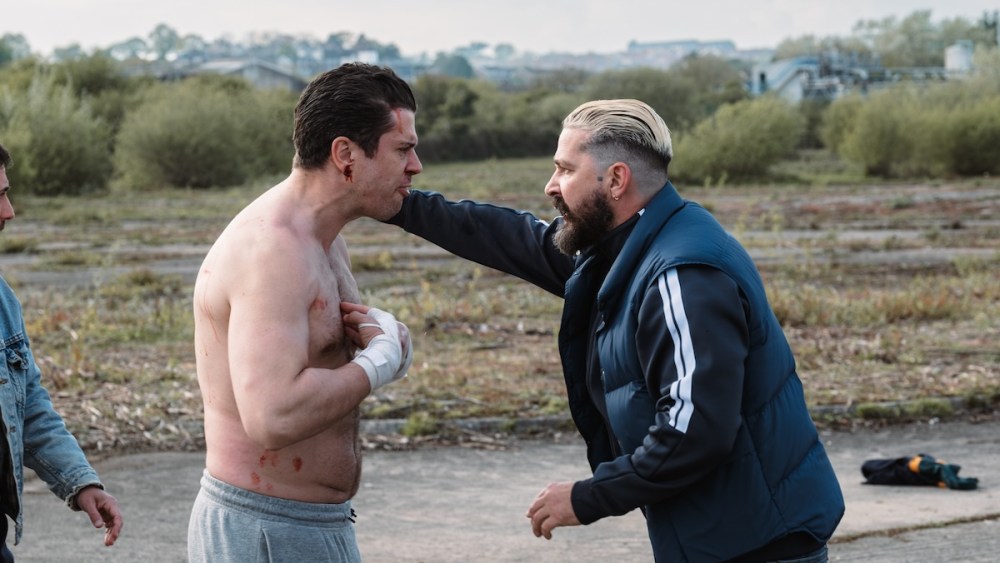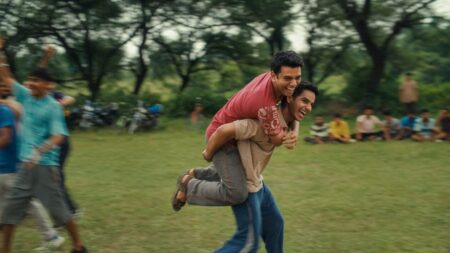The past-prime fighter struggling to rise above his hard-knock background was a screen cliché even when it fueled unexpected smash “Rocky” almost half a century ago. Since then, the same premise has been dusted off for regular reuse, often with extra helpings of “gritty” to make it seem less formulaic. But even that approach can feel mired in the same-old. English music video directing team Bjorn Franklin and Johnny Marchetta (billed as “Franklin & Marchetta”) make an assured feature bow with “Salvable,” which has Toby Kebbell from the “Planet of the Apes” films as one such boxer in a Welsh coastal town, beset by problems in and out of the ring.
With Shia LaBeouf and James Cosmo also on board, this downbeat tale has solid performances, an intriguing locale and accomplished visual presentation among its virtues. Nonetheless, Franklin’s script never quite transcends pedestrian familiarity, holding this watchable effort back from achieving the full dramatic weight aimed for. Lionsgate is releasing the U.K. production to U.S. theaters, on-demand and digital platforms May 2.
First seen getting pummeled by an invisible opponent in a black-and-white dream sequence, Sal “The Bull” Gostello (Kebbell) isn’t faring too well in the waking real world, either. He still trains with Welly (James Cosmo), owner of the local boxing gym. But as he’s pushing 40 and not in prime condition, the labor hardly seems worth it.
Sal’s ex-wife Elaine (Elaine Cassidy) has moved on to a new relationship, while remaining bitter over Sal’s perpetually flaky handling of his responsibilities — not least their daughter Molly (Kila Lord Cassidy), a sullen 14-year-old who’s been let down by dad too many times to much enjoy their court-mandated time together. His girlfriend Fay (Aiysha Hart) stomps out, accusing Sal of deceit in hiding much of his life from her, when in fact he’s just embarrassed to admit he lives in a shabby trailer in an open field.
He is gainfully employed as an orderly at an elder care facility. But even that low-end paycheck seems precarious, as he frequently gets blamed for causing problems he was actually trying to mediate.
Then an element of chaos is introduced (or reintroduced) into Sal’s already marginal existence: Old friend Vince (LaBeouf) surfaces, fresh out of prison. Welly cautions our hero to keep away, as Vince has been a bad influence before, but their friendship rekindles anyway. Soon enough, Sal is getting roped into no-holds-barred underground scraps orchestrated by Vince, which serve to generate gambling bets and settle scores amongst the shadier types hereabouts.
This kind of pugilistic slumming is unlikely to improve Sal’s circumstances, particularly once he refuses to “finish” a dirty-fighting but overmatched opponent. That results in a costly default, leaving Vince in a fiscal hole that leads to more seriously criminal activity. Meanwhile, there are ill-timed crises with Sal’s angry ex, unhappy daughter and day job.
All these conflicts culminate in a climax where an armed robbery goes awry just as Sal is scheduled for an (improbable) high-profile pro comeback bout. Still, the narrative doom spiral falls short of the tragic grandeur it’s meant to have achieved by this point — because while “Salvable” is competently crafted and cast, its thematic elements aren’t developed enough to attain the depth required for that payoff.
Franklin’s script just doesn’t find an emotional center among so many stock, under-articulated strands, though that may be partly due to thick accents rendering some dialogue unintelligible to American ears. Sal’s attempt to patch up his parental standing toward Molly draws sympathy, but is routinely dramatized across too few sequences that lend scant insight toward what got them to this trespass. The same goes for the dynamic with Vince. LaBeouf gives a solid performance that suggests moral ambiguity minus ill intentions, yet the ties that bind these two men remain sketchy at best. Cosmo is largely wasted in a rote cranky-but-loyal part that adds little to the undernourished whole.
Because none of these central relationships feel fully worked out in the writing, the primary burden for involvement falls on Kebbell, who brings imposing physicality as well a certain sad-sack credibility to the part. Yet Sal is one of those “losers” who has the deck stacked against him by little more than contrivance: We’re told he’s been an unreliable husband and father in the past, but the script seems afraid to show him as anything worse than unfairly put-upon. He doesn’t appear unintelligent, and is kind, dutiful and good at negotiating or defusing disputes. Elaine complains he’s always been “flittin’ here and flittin’ there,” but despite his reportedly very rough upbringing, the Sal on screen is a straight-up mensch. So treating him as the perpetual underdog who never had a real chance just doesn’t accrue much potency.
Shot in and around onetime leading coal port Barry, Vale of Glamorgan, “Salvable” could have milked more distinguishing cultural character from its Welsh setting. The actors’ variable stabs at a regional sound further muddy that identity, as does the decision to feature numerous tracks by very Irish singer-songwriter David Keenan, their working-class-hero gist conveyed by titles like “Guts” and “God Is a Magpie.”
Nonetheless, the film does have atmosphere, thanks to Simon Plunket’s widescreen cinematography achieving an effect that’s handsome but not prettified, a pervasive bluish lighting cast conveying an uphill-struggle melancholy in wordless terms. Though the fight sequences here are one more element that never quite seizes the central focus, they are convincingly brutal. Franklin & Marchetta have made a respectable first feature that is well-realized in every aspect — save the earnest but mediocre basic material it ultimately fails to elevate.
Read the full article here








